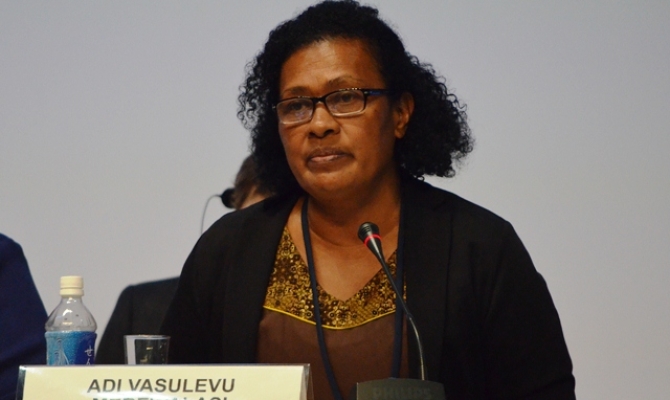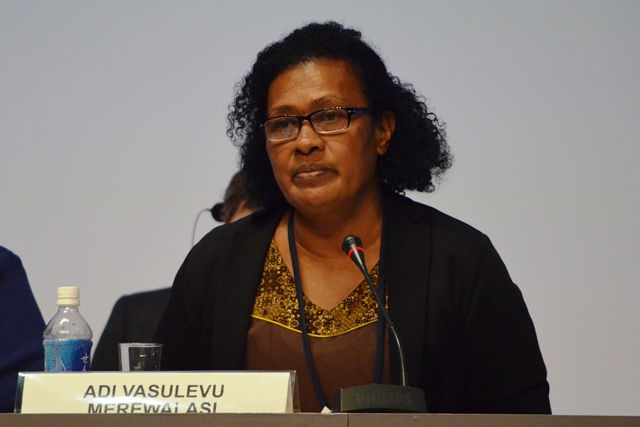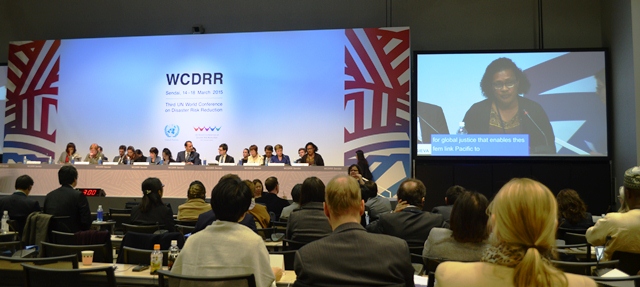
Climate Change Resilience
"Women are not simply a resource for Disaster Risk Reduction efforts, human or economic. Women are stakeholders, rights-holders, decision-makers and must be recognised as such." - Ms Adi Vasulevu Merewalasi FemLINKPACIFIC.

14 March 2015, Sendai, Japan - A voice sharing lessons learnt from the rural women of Fiji was heard from the front stage at the Third UN World Conference on Disaster Risk Reduction.
"Mobilising Women's Leadership in Disaster Risk Reduction" was discussed at the first High Level Multi-stakeholder Partnership Dialogues on day one of the conference.
Ms. Adi Vasulevu of FemLINKPacific spoke of the need for a stronger level of involvement from women in planning and adaptation processes in the Pacific to ensure a gender perspective and approach in national and local decision making processes and policy implementation.
She cited FemLINKPACIFIC's community media as an example, a community radio that is made up of community and women's voices and language.
"They make the news, they are the language. During extreme weather and early warning signs of disasters women are communicating via sms or they approach the radio to speak up and share their views fears and concerns," said Ms. Vasulevu as she addressed the room from the front podium.
"Commitment to the inclusion of women in decision making in policy and at implementation level is a necessary means of programme delivery, after all it is also the lives of women and children that are on the frontline of climate change and extreme weather events that exacerbate already long-held gender inequalities in our region, and elsewhere around the world."
Consistent advocacy over the last ten years has resulted in a recognition of the role of women in disaster risk reduction. The challenge now is to identify very practical ways and means to fully incorporate the knowledge and experiences of women in risk reduction planning and decision making.
Mobilising women's leadership is inextricably linked with the social, economic and cultural factors of the positioning of girls and women in society.
Thus, the roundtable explored how the post-2015 framework for disaster risk reduction can be utilised to expand and strengthen opportunities, and make full use of the leadership of women in disaster risk reduction looking at social, institutional, economic capacity and public awareness aspects.
"Community media, in particular the radio, has demonstrated the role as a bridge between communities and decision makers, in order to make sure that local communities are heard and to assure that they are consulted when adaptation measures are developed," presented Ms. Vasulevu.
"Continuous two-way information and communication is key to empowering the communities to become more resilient through their own knowledge and action, with the assistance of higher-level decision makers."

The event comprised the following high-level panel: H.E. Ms Tarja Halonen former President of Finland; Hon. Ms Emiko Okuyama, Mayor of Sendai; Ms Kristalina Georgiva, European Commissioner for Budget and Human Resources; Ms Ertharin Cousin, Executive Director WFP; Dr Babatunde Osotimehin, Executive Director UNFPA; and Ms Adi Vasulevu Merewalasi FemLINKPACIFIC.
The Partnership Dialogue was co-chaired by H.E. Ms Sanae Takaichi, Japan's Minister of Internal Affairs and Communication and H.E. Ms Loren Legarda, Senator, of the Philippines with the support of Moderator Mr. Riz Khan.
The Third UN World Conference on Disaster Risk Reduction is hosted in Sendai, Japan from 14 - 18 March. The Secretariat of the Pacific Regional Environment Programme is attending the 3WCDRR partnering with the UNISDR, Pacific Islands Forum Secretariat, Secretariat of the Pacific Community and the University of the South Pacific together with Pacific Island Countries and Territories to raise awareness of the Integrated Strategy for Climate and Disaster Resilient Development in the Pacific (SRDP). New Caledonia is also attending this 3WCDRR. The Pacific island region is the first to bring together climate change and disaster risk reduction in an overarching framework.

14 March 2015, Sendai, Japan - A voice sharing lessons learnt from the rural women of Fiji was heard from the front stage at the Third UN World Conference on Disaster Risk Reduction.
"Mobilising Women's Leadership in Disaster Risk Reduction" was discussed at the first High Level Multi-stakeholder Partnership Dialogues on day one of the conference.
Ms. Adi Vasulevu of FemLINKPacific spoke of the need for a stronger level of involvement from women in planning and adaptation processes in the Pacific to ensure a gender perspective and approach in national and local decision making processes and policy implementation.
She cited FemLINKPACIFIC's community media as an example, a community radio that is made up of community and women's voices and language.
"They make the news, they are the language. During extreme weather and early warning signs of disasters women are communicating via sms or they approach the radio to speak up and share their views fears and concerns," said Ms. Vasulevu as she addressed the room from the front podium.
"Commitment to the inclusion of women in decision making in policy and at implementation level is a necessary means of programme delivery, after all it is also the lives of women and children that are on the frontline of climate change and extreme weather events that exacerbate already long-held gender inequalities in our region, and elsewhere around the world."
Consistent advocacy over the last ten years has resulted in a recognition of the role of women in disaster risk reduction. The challenge now is to identify very practical ways and means to fully incorporate the knowledge and experiences of women in risk reduction planning and decision making.
Mobilising women's leadership is inextricably linked with the social, economic and cultural factors of the positioning of girls and women in society.
Thus, the roundtable explored how the post-2015 framework for disaster risk reduction can be utilised to expand and strengthen opportunities, and make full use of the leadership of women in disaster risk reduction looking at social, institutional, economic capacity and public awareness aspects.
"Community media, in particular the radio, has demonstrated the role as a bridge between communities and decision makers, in order to make sure that local communities are heard and to assure that they are consulted when adaptation measures are developed," presented Ms. Vasulevu.
"Continuous two-way information and communication is key to empowering the communities to become more resilient through their own knowledge and action, with the assistance of higher-level decision makers."

The event comprised the following high-level panel: H.E. Ms Tarja Halonen former President of Finland; Hon. Ms Emiko Okuyama, Mayor of Sendai; Ms Kristalina Georgiva, European Commissioner for Budget and Human Resources; Ms Ertharin Cousin, Executive Director WFP; Dr Babatunde Osotimehin, Executive Director UNFPA; and Ms Adi Vasulevu Merewalasi FemLINKPACIFIC.
The Partnership Dialogue was co-chaired by H.E. Ms Sanae Takaichi, Japan's Minister of Internal Affairs and Communication and H.E. Ms Loren Legarda, Senator, of the Philippines with the support of Moderator Mr. Riz Khan.
The Third UN World Conference on Disaster Risk Reduction is hosted in Sendai, Japan from 14 - 18 March. The Secretariat of the Pacific Regional Environment Programme is attending the 3WCDRR partnering with the UNISDR, Pacific Islands Forum Secretariat, Secretariat of the Pacific Community and the University of the South Pacific together with Pacific Island Countries and Territories to raise awareness of the Integrated Strategy for Climate and Disaster Resilient Development in the Pacific (SRDP). New Caledonia is also attending this 3WCDRR. The Pacific island region is the first to bring together climate change and disaster risk reduction in an overarching framework.